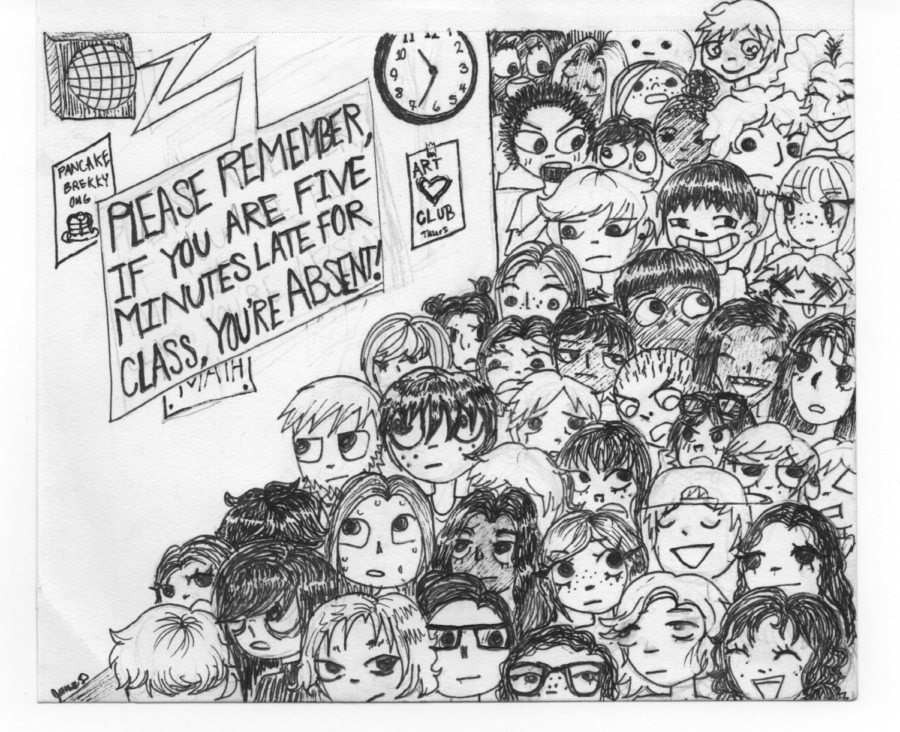A Sinister Tardy Policy
The tardy policy is especially difficult given how long it takes to get through the crowded hallways.
Last school year, if a student was twenty minutes late or fewer, they were marked tardy. As tardies built up for a student, they would have some disciplinary measure enacted upon them to reduce the number of tardies the student was receiving. These disciplinary measures included sweeping the cafeteria, Saturday school, or lunch detention. But this year, if a student is even five minutes late or more, they receive an unexcused absence that is irreversible.
While this could provide incentives for students to get to class on time, this policy could also discourage students from attending class.
Why would the average student attend class if they have already been marked absent? “This policy discourages me from attending class after I have been marked absent,” remarked Kenny Jahn, ‘24. And Jahn’s statement is representative of a large portion of the Boulder High community.
This policy is simply flawed. If a student is five minutes late, they miss only 10% of the class. And usually, the first five minutes of class are often spent settling in and rarely involve substantive class material. Five minutes does not correlate to an entire class missed, but because that’s what appears on Infinite Campus, this policy actually causes students to skip class more than encourages them to attend.
This policy also gives little leeway to students. People make mistakes. Students may forget when a class starts or wake up a few minutes late. Which, for teenagers, are things that should be acceptable once in a while. But since an absence of a single period looks so poor on Infinite Campus, there is no room to commit a couple of honest mistakes.
A buildup of absences benefits neither the student, the teacher, nor the administration. A tardy looks far less menacing on IC. With proper discipline enacted, as it was last year, there is no valid reason for the tardy policy to have been radically changed.
On top of this, Boulder High now requires students to show their physical ID cards in order to get into the building. Students who forget to bring their IDs must wait in a long line in the front office to obtain a “visitor” name card that allows them temporary access to the school. This line can take upwards of 20 minutes, which almost certainly causes students to be more than five minutes late.
Obviously, not bringing an ID is on the student, but the policy is still ineffective. The student showed up for school, which is what the administration strives for, but if the student doesn’t have their ID and will be marked absent after waiting in a long line, they have little incentive to go to class. Students may even leave school for the day, which, although there are some safety concerns, is far worse than being permitted access to the school without proof of a physical ID. Administration wants students to attend class but is making it increasingly more challenging to do so.
The new tardy policy, combined with the new ID policy, does far more harm than good. For the student body and administration alike, it would be beneficial to relinquish this new policy and revert to the policy that was in use last year.

Jonathan Stafford is a senior at Boulder High School this year and will be taking on the role of editor-in-chief. This is his third year with The Owl. He has always liked writing and sharing his opinions. He looks forward to sharing his thoughts and opinions with the Boulder High community. When not in school, Jonny enjoys playing basketball and baseball, fantasy football, hanging out with friends and family, and being out in nature. He feels that journalism is a great way to educate the general population while expressing his own opinions. One debate he feels passionate about is the grape debate. When it comes to this debate, he feels that purple grapes are superior to any other type of grape.


